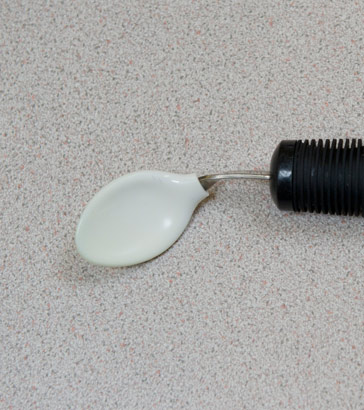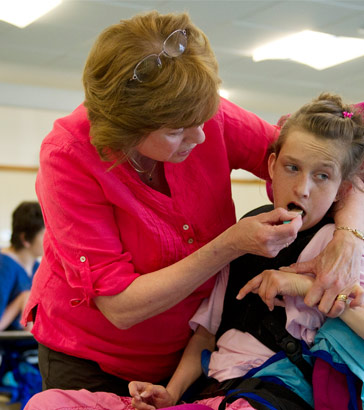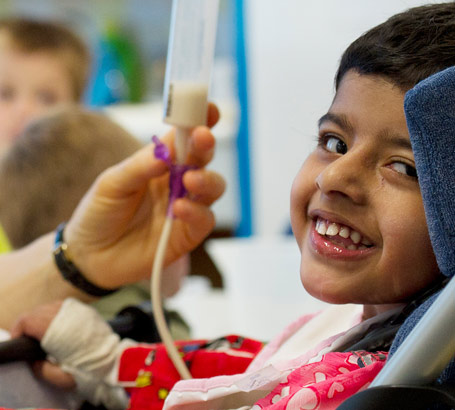
Children with the most severe EDS needs will require intensive support throughout their time at school and in adulthood.
Supported EDS ranges from providing modified consistency diets where food is puréed, and/or provision of adaptive tools (eg cutlery with larger handles or angled to allow a single movement from plate to mouth), to invasive procedures and processes needing the support of skilled medical staff to insert them, advise and train staff on feeding and care (eg enteral feeding via a tube into the stomach (gastrostomy) or small intestine (jejunostomy)).


It is important to remember that mealtimes are not just about eating but can also provide a valuable opportunity for communication and social interaction. They should be enjoyable occasions and as stress-free as possible.
Scope, 2010
The aim of specialist EDS support is to:
- Secure a child or young person's effective and safe nutrition and hydration through enjoyable meals.
- Maximise and develop their EDS skills.
- Provide timely and effective assessment and intervention.
- Develop effective and appropriate staff support strategies.
(Royal College of Speech and Language Therapists, 2006)

Assessing EDS difficulties can be carried out only by key allied health professionals with specialist training. It usually involves a multi-/trans-disciplinary team, commonly led by a speech and language therapist.
There is a strong association between the developmental skills needed for language and those for eating, swallowing and breathing.
Family involvement is important - to share training, their own knowledge, and ensure consistency around EDS.
The following health professionals may need to formally assess, advise and devise EDS support strategies and train staff to deliver them. Click on the cursor over the different professional titles to see their role in EDS. (There will be skill overlaps among the roles.)
Others in the team would include a doctor, health visitor, the family and the child or young person (if appropriate).
There are five sections, click on each section to find out more.
Identifies the nature of the eating, drinking and swallowing difficulties encountered by a child or young person and proposes
solutions.
 Return
Return
Devises optimum body positioning for and movement during eating, drinking and swallowing, allowing safe, comfortable and
effective intake of food or drink.
 Return
Return
Suggests personalised adaptations to tools and environment to increase comfort, efficiency and independence in eating,
drinking and swallowing.
 Return
Return
Ensures that a child or young person's nutrition is balanced and meets their needs (eg. through texture, calorific value,
etc.)
 Return
Return
Undertakes specialist nursing tasks, ensures that specialist advice is fully implemented, equipment is properly maintained
and checked, and hygiene, infection and safety procedures are followed.
 Return
Return
Speech and language therapist
Physiotherapist
Occupational therapist
Paediatric dietician
School nurse with specialist training

Visit the School Food Trust site and watch the videos where different professionals talk about assessing a young person for EDS difficulties. In particular watch:
- Assessing a child's eating and drinking skills: What a speech and language specialist considers.
- An occupational therapist overview: adapted utensils and seating for children with physical disabilities.
- What is a special diet? Why nutrition is important in special schools - a narrated power-point presentation.
- Modifying the texture of foods: How to assess if food can be puréed.
Note down the key points of what they are saying and the potential risks in eating, drinking and swallowing for children
and young people with
SLD/PMLD/CLDD.

Wherever possible children's dignity and independence should be supported and facilitated by encouraging them to:
- Develop and increase their independence in EDS; for example, indicating their readiness to take in food or drink (e.g. requesting 'more' using AAC or by physical movements, etc.)
- Make reasonable choices at a level that is meaningful to them, and giving them enough time to do so.
- Develop healthy eating habits.
Some children will need greater privacy at mealtimes; for example, if they are distracted or made anxious by others around them so they become unable to eat or drink.

Your school will have policies, written guidance, protocols and individual care plans relating to EDS. Policies will include as required:
- Infection Control Policy
- Moving and Handling Policy
- Health and Safety Policy
- Tube Feeding Protocols

The need for all staff who work with children and young people with complex additional support needs to be trained by the speech and language therapist to recognise, understand and manage eating, drinking and swallowing difficulties is considered crucial.
The Scottish Government/APS Scotland, 2011
All staff working in this area need both generic training around EDS, and training specific to the child they are supporting.

Royal College of Speech and Language Therapists (2006) Communicating Quality 3: RCSLT's guidance on best practice in service organisation and provision (3rd edn). London: Royal College of Speech and Language Therapists.
Scope beta (2010) Eating and meal times: A guide to eating issues for people with cerebral palsy and those that care for them.
The Scottish Government/APS Group Scotland (2011) Healthy Eating in Schools: Supplementary guidance on diet and nutrition for children and young people with additional support needs. Edinburgh: The Scottish Government.